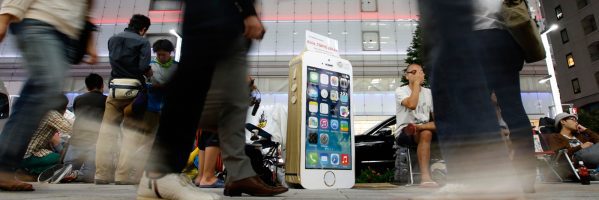Political Turnover, Gaming, and Venture Acceleration – Chicago News

Let’s explore some of the most interesting stories that have emerged from Chicago business schools this week.
Why Economic Crises Trigger Political Turnover in Some Countries but Not Others – Kellogg Insight
New research from Northwestern Kellogg Professor of Managerial Economics and Decisions Nancy Qian explores “how much the people of a country typically trust other people” in an attempt to understand why recessions are catalysts for political turmoil in certain countries, like Greece, and not others, like Norway.
Qian explains that trust plays a key role.
“If I’m a less trusting person, I might say something like, ‘I don’t understand the details of what our leader is doing, but most politicians are bad and they’re lazy, so it is probably his fault. It’s about how likely I am to attribute the economic problems to circumstance or luck versus to the political leadership.”
The researchers found that “economic downturns were less likely to cause political turnover in high-trust countries, like Sweden (63 percent) than in low-trust ones, like Italy (29 percent).”
Qian explains that their findings “have direct implications for how nations approach economic interactions.”
“If we think our trade decisions are going to have economic effects in those nations, we need to also consider the potential political consequences,” Qian says. You can read the rest of the research here.
Keep Them Guessing, Keep Them Gaming – Chicago Booth Blog
In a new Journal of Consumer Research study from Chicago Booth Professor Christopher Hsee and the Chinese University of Hong Kong’s Luxi Shen, it was found that “people repeat a task more for an uncertain incentive than for a certain incentive, even when the uncertain incentive is financially worse.”
According to the Chicago Booth Blog entry, “one reason uncertain incentives motivate behavior is the psychological boost consumers get in moving from the unpleasantness of uncertainty to the satisfaction of certainty resolution.”
Hsee and Shen’s research suggests that efforts to entice consumers to repeat behaviors “may be even more successful if consumers don’t know the amount of the reward in advance.”
You can read the full article here and find “The Fun and Function of Uncertainty: Uncertain Incentives Reinforce Repetition Decisions” here.
Spine Injury Inspires Mark Van den Avont to Create Better Sports Mats – Gies College of Business Blog
Following a high school spine injury that broke the T11 and T12 vertebrae during a backflip dismount, current University of Illinois mechanical engineering sophomore Mark Van den Avont founded HexNest with the goal to create safer and more cost-effective mats.
HexNest is an outgrowth of Gies’ iVenture Accelerator through which he received a $2,500 summer housing stipend and a $10,000 grant to fund “product development, buying competitors’ mats and purchasing equipment to make his mats.”
Van den Avont writes:
“iVenture has been extremely important because I was able to work on HexNest full-time over the summer and devote all my energy to it. It’s great being around other entrepreneurs as well. I’ll be at the iVenture Accelerator at 10 pm on a Tuesday night or early Sunday morning, and I’ll look to my left and right, and everybody’s here.”
You can read more about HexNest and Van den Avont’s journey here.
The Politics of Purchases, Grocery Chain Rebuilds, and More – Boston News

Let’s explore some of the most interesting stories that have emerged from Boston business schools this week.
Why U.S. Grocery Chains Need More (and Better) Store-Brand Products – Harvard Business Review
Harvard Business Review recently revealed new insights into how store-brand products enable grocers to carve out a niche for themselves among more established competitors.
According to writers Marcel Corstjens and Rajiv Lal, “private-label products are essential to the profit margins of hard discounters,” like Wal-Mart, which typically sell 90 percent private-label goods compared to 15-51 percent of ordinary grocery stores, depending on where you are in the world. “Hard discounters win by only stocking products with a very high rotation.”
The two point to the miraculous feat of French supermarkets, which regained a significant market share after stores began “offering affordable goods of reasonable quality.”
In order for U.S. grocers to compete with hard discounters, the article notes that they “will have to offer private-label goods of the “right” quality at the “right” price. No easy feat, indeed.
You can read more from Corstjens and Lal here.
How Going Out Can Spur Outside-the-Box Thinking – MIT Sloan Newsroom
New research from MIT Sloan Assistant Professor of Work and Organization Studies Jackson Lu finds that people who have “had a close friendship or romantic relationship with a person from a culture drastically different from [their] own tend to exhibit higher creativity, innovation, and entrepreneurship.”
“‘Going Out’ of the Box: Close Intercultural Friendships and Romantic Relationships Spark Creativity, Workplace Innovation, and Entrepreneurship” suggests that “people cannot simply ‘collect’ intercultural relationships at a superficial level, but instead must engage in cultural learning at a deep level.”
Lu writes:
“When in an intercultural relationship, an individual should not eschew cultural differences but rather embrace them, because such differences enable one to discern and learn the underlying assumptions and values of both the foreign culture and the home culture. Without close social interactions, it can be difficult for individuals to juxtapose and synthesize different cultural perspectives to achieve cultural learning and produce creative insights.”
You can check out the rest of the article here.
How We Play Politics in the Store Aisles – Carroll School News
In a new Journal of Consumer Research study, Carroll Assistant Professor of Marketing Nailya Ordabayeva finds that “conservatives buy products they believe will signal their own superiority (big-name brands, high price tags) while liberals buy products they hope will show their uniqueness (unconventional colors or design).”
Ordabayeva’s research has “startling implications regarding the extent of our national polarization,” suggesting that people are paying very close attention to taglines like Mercedes’ “A Class Ahead” and Apple’s “Think Different.”

Professor Ordabayeva’s research finds that conservative and liberal Americans have decidedly different buying patterns, with conservatives favoring well-known brands and liberals opting for more creative choices.
“Better or Different? How Political Ideology Shapes Preferences for Differentiation in the Social Hierarchy,” can be found here and check out the rest of the entry on Carroll School News here.
MIT on the Problems with Twitter, and More – Boston News

Let’s explore some of the most interesting stories that have emerged from Boston business schools this week.
Marketers Take Note: When Too Many Choices are a Burden, Not a Benefit – Questrom School of Business News
BU Questrom School of Business Ph.D. alum Sarah Whitley recently co-authored a new Journal of Consumer Research paper with Associate Professor Remi Turdel and fellow Assistant Professor Didem Kurt, in which they discovered “that people typically want more choices when they’re buying for pleasure [and they want] fewer choices when they make a purchase for strictly utilitarian or functional reasons.”
The research dives into what is more commonly known as the Paradox of Choice. The idea crept into the market lexicon shortly after the release of the 2004 book The Paradox of Choice – Why More Is Less from psychologist Barry Schwartz, NYU alum and U. Penn Ph.D. The general idea Schwartz derived was that consumer anxiety could be caused by too many options. However, research from Whitley, Turdel, and Kurt reveal that it may only pertain to specific kinds of purchases, not simply overall.
Whitley says the major takeaway is that businesses can be more strategic if they know “what motivates the buying decisions of their customers.”
“For product categories where people feel that they have unique preferences, it may be worth it to have more variety. It may be fine to reduce the number of offered products where this is not the case.”
You can read the full article here.
Solving Twitter’s ‘Follow-Back’ Problem – MIT Sloan Newsroom
About four years ago, MIT Sloan Associate Professor of Operations Tauhid Zaman put together a social media experiment in which he used Taylor Swift’s friends on Twitter to “open the gates to her inner circle.”

Dubbed the “follow-back problem,” Zaman sought to understand “the underlying dynamics of follows on Twitter, [such as] what kinds of Twitter interactions matter the most when trying to get followers? And do overlapping social networks actually help build connections? If they do, then to what degree do they help?”
Zaman found that Twitters “who don’t follow many other people are unlikely to follow you back, while those who follow a lot of people are likely to follow you if you follow and retweet them.” He also found that if, for instance, “Swift follows somebody who, in turn, follows Zaman, then Zaman has a greater chance that Swift will follow him.”
The article notes that social media tools can “have a tremendous blast radius” in terms of their ability to powerfully influence the opinions of a whole country.
“In my opinion, this can be far more dangerous than conventional weapons which have a fixed blast radius. These are weapons, and I’m building efficient ways to use the weapons, so this has to be handled with care,” Zaman said.
Read the full article, the first in a three-part series examining new work about Twitter, influence, and bots, here.
How CEOs Manage Time – Harvard Business Review
Harvard Business School Professors Michael E. Porter and Nitin Nohria recently published a piece in the Harvard Business Review that examines how CEOs allocate their time.
According to the article, face-to-face interactions take up “61 percent of the work time of the CEOs we studied. Another 15 percent was spent on the phone or reading and replying to written correspondence. The final 24 percent was spent on electronic communications.”
The authors describe the CEO’s job as “relentless.” They write, “Given that work could consume every hour of their lives, CEOs have to set limits so that they can preserve their health and their relationships with family and friends. To sustain the intensity of the job, CEOs need to train—just as elite athletes do. That means allocating time for health, fitness, and rest.”
You can read the full article here.
How Natural Disasters Can Turn into Economics Disasters – Chicago News

Let’s explore some of the most interesting stories that have emerged from Chicago business schools this week.
Localized Natural Disasters Can Hurt an Entire Country’s Economy – Kellogg Insight
Northwestern Kellogg School of Management associate professor of managerial economics and decision sciences Alireza Tahbaz-Salehi set out to understand the large-scale economic implications of natural disasters.
Tahbaz-Salehi worked with Vasco Carvalho of the University of Cambridge, Makoto Nirei of the Ministry of Finance of Japan, and Yukiko Saito of the Research Institute of Economy, Trade and Industry in Japan. After the 2011 earthquake, “disaster-affected firms’ connections to companies outside the regions affected by the quake had a strong effect: these links accounted for a 1.2 percent decline in Japan’s gross economic output the year after the disaster.”

The aftermath of the 2011 earthquake in Japan hurt economic productivity for a lengthy period of time. Photo via Reuters
Tahbaz-Salehi says, “If these shocks start propagating from a firm to its customers, to its customers’ customers, and so on, they may also have an aggregate effect on the entire economy. But there have been almost no empirical studies to document whether these effects exist and how big they are.”
You can read more from Kellogg Insight here.
Hitting Rock Bottom After Job Loss Can Be Beneficial – Mendoza College of Business
To paraphrase Beckett, “Try, fail, try again, fail again, fail better.” Notre Dame Mendoza College of Business‘ Siegfried professor of entrepreneurship Dean Shepherd recently co-authored a study in Academy of Management Review with Indiana University’s Trenton Williams, which finds that on the road to success, failure is often the most revealing option.
“On the way down, we frantically do all sorts of things to try and repair the situation, and suffer as they fail. Bottoming out frees us from the misconception that the problems can be fixed, and in the process, frees us from other constraints and negative emotions and provides the conditions necessary to find a viable solution.”
He continues:
“‘A failed corporate executive might consider a variety of other potential roles,’ Shepherd says. ‘For example, sitting on the board of a nonprofit organization that is desperate for experienced managerial guidance, exploring government positions or running for office, working with startups, and so forth. Similarly, a failed entrepreneur might explore how skills learned in starting a business could be applied in a corporate setting, take standardized exams to be considered for law school or engage in other low risk exploration activities. In these cases, hitting rock bottom opens up myriad new opportunities.’”
Read more about the duo’s research here.
Would You Pay $20 a Day to Lease a Luxury Car? – Booth School of Business
University of Chicago Booth School of Business associate professor Daniel Bartels and the University of Rhode Island’s Stephen Atlas are scheduled to publish a new study in the Journal of Consumer Research entitled, “Periodic Pricing and Perceived Contract Benefits,” which finds that people “perceive more benefits from their purchases if they make payments on a periodic basis.”

Research from Booth shows that people feel their purchases are more valuable if its paid off in repeated cycles. Photo via NY Auto Show.
“Our framework and results suggest that periodic pricing can help people appreciate the benefits they accrue from a purchase. So, under the right conditions, marketers can encourage purchase with periodic pricing, even for significant sums of money.”
Read more about the duo’s research here.
Misty Johnson Named Business Dean – DePaul Driehaus College of Business and Kellstadt Graduate School of Business
As of March 1, the Driehaus College of Business and Kellstadt Graduate School of Business formally introduced its newest business college dean, Misty Johnson, Ph.D.
Johnson became the interim dean of the business college back in July, replacing former dean Ray Whittington. With her role now official, she has become the first-ever female dean of DePaul’s business school.
“Dr. Johanson has done a laudable job, and I’m pleased the college will continue to benefit from her leadership and expertise,” DePaul University Provost denBoer said in a press release.
“During her tenure this academic year, fall graduate business enrollment increased 16 percent; staff roles were reimagined to enhance the student experience; master’s program and center directors began collaborating more closely to support graduate program success, and the college forged stronger industry connections to support career opportunities. Johanson also launched a campaign with the Office of Advancement to raise $4 million for the college by the end of the academic year and exceeded the goal within the first six months.”
You can read more about the official appointment of Dr. Johnson here.
5 New Faculty Join Rady for Coming School Year

School’s almost back for the season. That means that campuses will be teeming with new students—and even new faculty. The Rady School of Management at the UC San Diego has added five new professors this school year, according to a recent press release.
The new additions are Jeremy Bertomeu, Associate Professor of Accounting; Edwige Cheynel, Assistant Professor of Accounting; Uma Karmarkar, Assistant Professor of Marketing and ITO; Michael Meyer, Assistant Teaching Professor of ITO; and William Mullins, Assistant Professor of Finance.
“These new faculty bring exceptional credentials to our school and join a team of Rady School faculty who are internationally recognized for the quality of their research,” Dean Robert S. Sullivan said in the press release.
And the dean is right: The school already boasts faculty members who are experts in their field, including ones who have taught at New York University and the UCLA Anderson School of Management, among many others. Some professors like Wendy Liu have even had their work published in nationally lauded journals like Journal of Consumer Research and Organizational Behavior and Human Decision Processes, as well as media publications like Time Magazine.
These three professors joining the faculty in the fall bring expertise from varying fields: accounting, finance, innovation, marketing, and technology and operations. They also have built some impressive resumes from their previous employers. Bertomeu has taught at Baruch College in New York. Cheynel was previously with the Columbia Business School. Karmarkar was teaching at the Harvard Business School, and Mullins is heading to San Diego from the Sloan School of Management at MIT.
These faculty will teach in all different programs within the Rady School including the MBA, Master of Finance, and Master of Science in Business Analytics programs. The school has been slowly growing its faculty numbers to accommodate the launch of its Master of Finance and Master of Science in Business Analytics degree programs. In the past two years, the faculty has grown by 12 people.
Stanford Study Finds Correlation Between Polarizing Products and Consumers

Stanford Graduate School of Business recently revealed a new study that explores how online product ratings influence consumer behavior.
